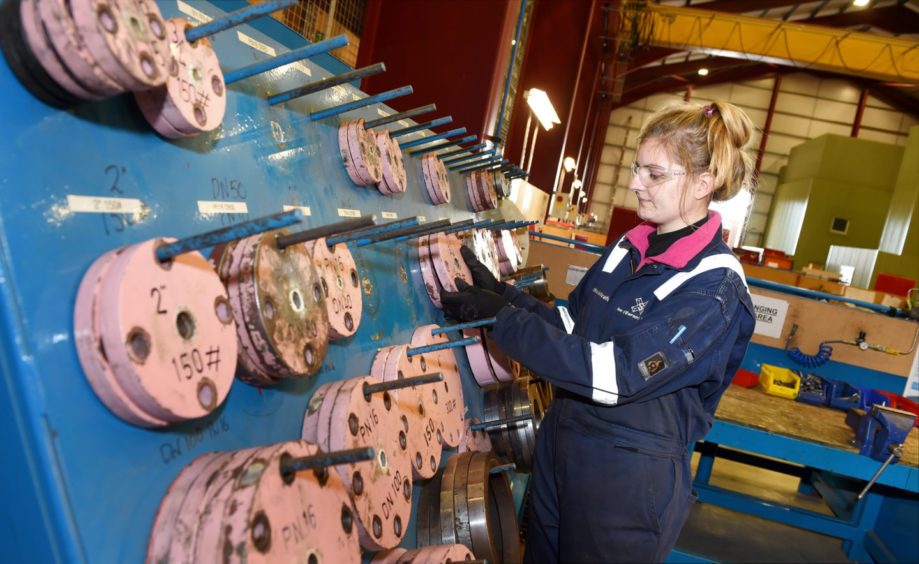
The pandemic has made the task of finding “positive destinations” for young people more difficult than ever.
Fortunately, chiefs at two of the north-east’s top training providers are as committed as ever to preventing young people from getting “lost in the system”.
Peterhead Engineers Development (PEDL) and its biggest user, Score Group, are adapting and overcoming the hurdles put up by Covid.
PEDL and other training organisations have been grouped with the education sector in terms of restrictions. It means that for much of the past year, the organisation has been unable to give trainees an opportunity to operate equipment and receive face-to-face assessment.
This has created a backlog which could have a “knock-on” impact on succession plans.
Trainees at PEDL spend their first year at the centre, before going out to an employer. Due to lockdown restrictions most of the trainees PEDL had at the centre in March 2020 are yet to move on.
The training provider has embraced online learning to conduct interviews and cover theoretical aspects of its courses. But its training is largely practical in nature, of course.
PEDL managing director Leighton Willox said: “The group that started in January 2020 would have completed their programme in December 2020.
“However, now they might be with us for another six months at least, so it has created a backlog.
“We have been very imaginative in the way we’ve worked. We’ve done as much remote learning as possible. Our instructors and trainees have adapted very well.
“They’re submitting remotely but the hurdle is the practical work.
“If somebody has been doing driving lessons, you wouldn’t go to the situation where the instructors’ word would be used as a basis for them being allowed to pass their driving test.”
PEDL did manage to open its doors for a few months at the end of 2020 after going through rigorous checks and putting measures in place to operate safely.
That allowed PEDL’s August 2019 intake of 17 trainees to complete their programme.
At the time of writing, Score intended to start working with the first cohort of 2021 on February 22. Steven Wilson, the engineering firm’s apprentice manager, said Score had plans “A, B and C” ready and waiting, depending on the restrictions in place.
This entails early engagement being limited to online and reducing capacity, adjusting shift patterns and adhering to social distancing rules when the government says on-site tuition can resume.
Wilson said there were some advantages to the current regime, for example, online interviews cutting down journey times for applicants. But it seems there are at least as many obstacles as opportunities, if not more.
Most training organisations will have to deal with the aforementioned backlogs, in the first instance, before they can ramp up their intake.
And while some applicants have taken to online interviews like ducks to water, others need IT support, or feel uncomfortable articulating themselves in a “virtual setting”.
Both Willox and Wilson said being able to resume work experience for school pupils would provide a boost.
Willox said placements, which have not been possible over the last year, were an important part of the recruitment cycle.
They give young people an insight into what an apprenticeship would be like.
This often imbues young people with the confidence they need to submit an application.
Both men are concerned that a lack of work experience opportunities will dent efforts to recruit young people, particularly girls.
Wilson said: “Work experience is a ‘try before you buy’. You will generally get more females trying that and potentially applying for an apprenticeship. If you can get young women in for work experience, it almost certainly leads to an application form.”
Issues that existed pre-pandemic have not gone away. Those include the decline in maths competency.
Wilson said Score worked closely with schools to address the problem, in part by linking maths to real life situations.
He also said Score’s apprenticeship was an antidote to the much-talked-about skills shortages in the oil and gas sector.
“That is the reason we take in a high volume, because there absolutely is a skills shortage and we’re doing our piece to address that,” he said.
He said Score has been taking in apprentices for 30 years and has no plans to stop. The firm usually has 200-300 trainees on its books, globally.
Willox, who also holds the role of group head of HSEQ and training, in addition to his position at PEDL, said apprentices had “dried up” and almost become a “bad word” in the 1990s.
But they have become more popular since the turn of the century.
He said the likes of Score could get a glut of applications as young people leave school to find a dearth of opportunities in other sectors.
He said: “As disrupted as school has been, they’re still running at a normal speed.
“But the school leavers are coming into an apprenticeships sector which is running a bit slower than it normally would.
“Some school pupils are staying a bit longer in the school than they normally would, but at some point they will have no option but to leave.
“I do have a concern about people getting lost in the system with opportunities not opening up as quickly as they normally would, so we might get a
glut of applications in future.”
Wilson added: “What I’m sensing is a reluctance by some pupils to move out of schools.
“The job market uncertainty is enough to have them retain their interest in the school system but at some point they will have to leave.
“That will probably hit industry as a larger output from schools that we need to find positive destinations for.”
Recommended for you

